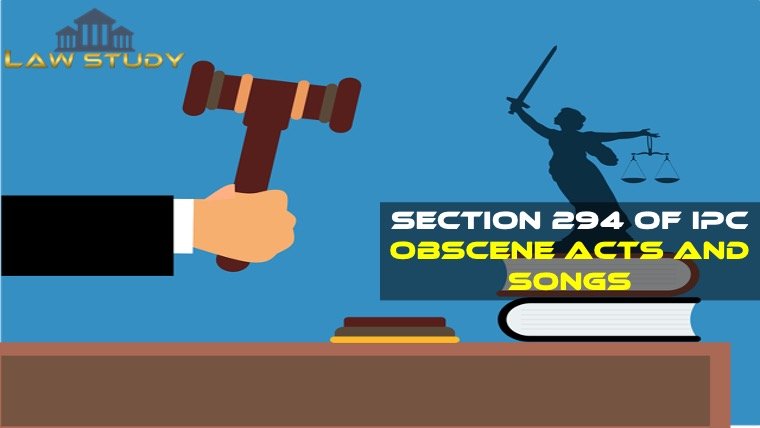Introduction of Section 294 IPC: Obscene Acts and Songs: – Obscenity is a worldwide & difficult issue since it is intertwined with other factors like ethics as well as decency, which vary by society. What one person considers to be unethical may not be considered to be immoral and wrong for another. Considering the society’s cultural, religious, and socioeconomic variables, providing a specific & detailed explanation of obscenity is impossible.
However, the meaning of obscenity changes throughout time. What is considered obscene today should not be considered obscene future. Obscenity has been defined imprecisely by Indian statutes and the Supreme Court.
The Indian legal system, on the other hand, contains a number of statutes dealing with obscenity and how it is penalized. One such provision is Sec. 294 of I.P.C,1860. It punishes indecent acts, words, or songs.
Section 294 IPC
Anyone who, to the annoyance of others or the public in general, conducts an indecent act in any public place, or specifically commits to performing things like reciting, singing, or speaking an obscene song, ballad, or words in any public area shall be punished with up to 3 months of imprisonment, a monetary fine, or both.
essential ingredients are as follows:
- Indulging in any obscene conduct in public, or
- Anyone utters, recites, acts, or sings in or near any public place.
- Such an act annoys a specific person or a group of people in general.
- Individuals cannot be penalized under this Section if all of the mentioned prerequisites are not met. The act or song will not be considered obscene if even one of the elements is missing.
Nature of Section 294 IPC
- Bail is granted u/s 294 of IPC. Bailable offences are considerably less serious than non-bailable offences.
- The violation of Sec.294 of the IPC is a cognizable offence.
- Sec. 294 is non-compoundable in nature & can’t be compromised(settle a dispute by mutual concession).
- Anyone convicted of obscene acts or songs u/s 294 of the IPC faces a maximum sentence of 3 months imprisonment, a monetary punishment, or both.
Freedom of Speech & Expression vs. Obscenity: a never-ending conflict
The right to free expression guaranteed by Art 19 is not limitless, which indicates it is subject to certain limitations imposed by the Constitution itself. These limitations are defined in Art 19 of the Indian Constitution, clauses 2–6, and are referred to as “reasonable restraints”.
Among the justifications are state integrity and sovereignty, state security, cordial relations with foreign nations, public security, morality and decency, perverting the course of justice, blasphemy, and incitement to an offence. The State may impose legal restrictions on the exercise of the freedoms provided in Article 19(1) Executive action is the use of the state’s ability to limit freedom& liberty through legislation.
Decency & morality are two of the factors U/A 19(2) of Article 19 Of the Constitution that can be used to impose reasonable limits on freedom of speech and expression. Depending on society’s moral values, such concepts vary from country to country.
case laws related to sec 294 of IPC
Case laws are judicial observations that add some clarification to the requirements of Section 294 IPC.
Pawan Kumar v State of Haryana (1966)
It was argued in the case, that judges must be fully aware of evolving moral perceptions and concepts in order to analyze the consequences of Sec 294 on today’s society and its norms, as well as evolving perceptions of obscenity.
Patel H.M. Malle Gowda vs. The State Of Mysore (1972)
The Karnataka H.C. noted in this matter that because annoyance (the feeling or state of being annoyed; irritation), a key feature of the crime under this Section, is often related to the state of mind, establishing it as a fact by positive evidence is difficult. It is a fact by positive evidence always based on verifiable facts.
Narendra H. Khurana vs. Commr. of Police (2003)
The Bombay H.C. ruled that cabaret dances wherein indecent & immoral activities are conducted do not violate Section 294 IPC unless evidence of “annoyance to others” is proven. It’s extremely unclear how the contentious act could annoy people who don’t watch it or disrupt public harmony. It’s like suggesting that watching a Hindi film featuring a seductively clothed dancer provocatively disrupts public order. It further stated that a cabaret into which a person enters after purchasing a ticket does not constitute a “public place” underneath the provision.
Saraswathi v State of TN (2002)
In the matter, it was determined that the major ingredient of the offence u/s 294(b) of the I.P.C. is uttering statements in a public place that disturb/annoy others.
Conclusion
India’s person is still conservative in terms of what is considered obscene and what is not. Even exposing a lot of skin can be considered ‘obscene’ in some cases. Obscenity is originated from one of the Indian terms of the law with vague or imprecise interpretations. Advocates and judges determine what includes obscene content based on how they define the term “obscene.” Correct the definition of obscene changes throughout time.
We understand that legislation must always be amended from time to time, but there is a necessity for an appropriate interpretation of obscenity. It is vital to highlight that in our country, the right amount of indecency in cinema, web shows, photographs or photos, literature & art has yet to be determined.

























